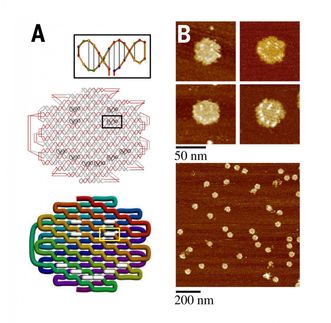New method of mass-producing high-quality DNA molecules
A new method of manufacturing short, single-stranded DNA molecules can solve many of the problems associated with current production methods. The new method, which is described in the scientific periodical Nature Methods, can be of value to both DNA nanotechnology and the development of drugs consisting of DNA fragments.
The novel technique for manufacturing short, single-stranded DNA molecules – or oligonucleotides – has been developed by researchers at Karolinska Institutet in Sweden and Harvard University. Such DNA fragments constitute a basic tool for researchers and play a key part in many fields of science. Many of the recent advances in genetic and molecular biological research and development, such as the ability to quickly scan an organism’s genome, would not have been possible without oligonucleotides.
The new method is versatile and able to solve problems that currently restrict the production of DNA fragments.
“We’ve used enzymatic production methods to create a system that not only improves the quality of the manufactured oligonucleotides but that also makes it possible to scale up production using bacteria in order to produce large amounts of DNA copies cheaply,” says co-developer Björn Högberg at the Swedish Medical Nanoscience Center, part of the Department of Neuroscience at Karolinska Institutet.
The process of bioproduction, whereby bacteria are used to copy DNA sequences, enables the manufacture of large amounts of DNA copies at a low cost. Unlike current methods of synthesising oligonucleotides, where the number of errors increases with the length of the sequence, this new method – according to the developers – also works well for long oligonucleotides of several hundred nitrogenous bases.
The DNA molecules are first formed as a long string of single-stranded DNA in which the sequence of interest is repeated several times. The long strand forms tiny regions called hairpins, where the strand folds back on itself. These hairpins can then be cut up by enzymes, which serve as a molecular-biological pair of scissors that cuts the DNA at selected sites. Several different oligonucleotides can thus be produced at the same time in a perfectly balanced combination, which is important if they are to be crystallised or used therapeutically.
“Oligonucleotide-based drugs are already available, and it’s very possible that our method could be used to produce purer and cheaper versions of these drugs,” says Dr Björn Högberg.
Original publication
Cosimo Ducani, Corinna Kaul, et al., ‘Enzymatic Production of Monoclonal Stoichiometric Single-Stranded DNA Oligonucleotides’, Nature Methods, online 2 June 2013
Most read news
Original publication
Cosimo Ducani, Corinna Kaul, et al., ‘Enzymatic Production of Monoclonal Stoichiometric Single-Stranded DNA Oligonucleotides’, Nature Methods, online 2 June 2013
Organizations
Other news from the department science

Get the life science industry in your inbox
By submitting this form you agree that LUMITOS AG will send you the newsletter(s) selected above by email. Your data will not be passed on to third parties. Your data will be stored and processed in accordance with our data protection regulations. LUMITOS may contact you by email for the purpose of advertising or market and opinion surveys. You can revoke your consent at any time without giving reasons to LUMITOS AG, Ernst-Augustin-Str. 2, 12489 Berlin, Germany or by e-mail at revoke@lumitos.com with effect for the future. In addition, each email contains a link to unsubscribe from the corresponding newsletter.
More news from our other portals
Last viewed contents
Apax Partners Forms Aerovance, Inc., Through Spin Out of Bayer Biotechnology Respiratory Projects - New Company Raises $32 Million in Series B Financing Led by Apax Partners
List_of_Vanilla_species























































